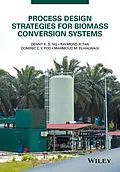This book covers recent developments in process systems engineering (PSE) for efficient resource use in biomass conversion systems. It provides an overview of process development in biomass conversion systems with focus on biorefineries involving the production and coproduction of fuels, heating, cooling, and chemicals. The scope includes grassroots and retrofitting applications. In order to reach high levels of processing efficiency, it also covers techniques and applications of natural-resource (mass and energy) conservation. Technical, economic, environmental, and social aspects of biorefineries are discussed and reconciled. The assessment scales vary from unit- to process- and life-cycle or supply chain levels. The chapters are written by leading experts from around the world, and present an integrated set of contributions. Providing a comprehensive, multi-dimensional analysis of various aspects of bioenergy systems, the book is suitable for both academic researchers and energy professionals in industry.
Autorentext
Denny Ng is a Professor at the Department of Chemical and Environmental Engineering, University of Nottingham Malaysia Campus.
Raymond R. Tan is a University Fellow and Professor of Chemical Engineering at De La Salle University, Manila, Philippines. He is also Director of that institution's Center for Engineering and Sustainable Development Research. His main research interests are process systems engineering, life cycle assessment and pinch analysis.
Dominic Foo is a Professor of Process Design and Integration at the University of Nottingham Malaysia Campus. He is a world leading researcher in resource conservation with process integration techniques, and has two forthcoming books and over 180 scientific papers. He is the winner of the Innovator of the Year Award 2009 (Institution of Chemical Engineers, UK) 2010 Young Engineer Award (Institution of Engineers Malaysia (IEM), Outstanding Young Malaysian Award 2012 (Junior Chamber International, JCI) and winner of the SCEJ Award for Outstanding Asian Researcher and Engineer 2013 (Society of Chemical Engineers, Japan).
Mahmoud M. El-Halwagi is Professor at the Artie McFerrin Department of Chemical Engineering at Texas A&M University. Prof El-Halwagi is the author of three textbooks on process integration and sustainable design and more than a 150 papers and book chapters in the fields of sustainability, biorefining, and integrated process design.
Inhalt
List of Contributors xiii
Preface xvii
Acknowledgments xxi
Part 1 Process Design Tools for Biomass Conversion Systems 1
1 Early?-Stage Design and Analysis of Biorefinery Networks 3
Peam Cheali, Alberto Quaglia, Carina L. Gargalo, Krist V. Gernaey, Gürkan Sin, and Rafiqul Gani
1.1 Introduction 3
1.2 Framework 5
1.2.1 Sustainability Analysis 10
1.2.2 Environmental Impact Assessment 12
1.3 Application: Early?-Stage Design and Analysis of a Lignocellulosic Biorefinery 15
1.3.1 Biorefinery Networks and Identification of the Optimal Processing Paths 15
1.3.2 Sustainability Analysis with Respect to Resource Consumption and Environmental Impact 29
1.4 Conclusion 34
Nomenclature 35
References 37
2 Application of a Hierarchical Approach for the Synthesis of Biorefineries 39
Carolina Conde?-Mejía, Arturo Jiménez?-Gutiérrez, and Mahmoud M. El?-Halwagi
2.1 Introduction 39
2.2 Problem Statement 41
2.3 General Methodology 42
2.4 Simulation of Flowsheets 44
2.5 Results and Discussion 49
2.5.1 Level 1 49
2.5.2 Level 2 51
2.5.3 Level 3 51
2.5.4 Level 4 53
2.5.5 Level 5 55
2.5.6 Level 6 56
2.6 Conclusions 57
References 57
3 A Systematic Approach for Synthesis of an Integrated Palm Oil?-Based Biorefinery 63
Rex T. L. Ng and Denny K. S. Ng
3.1 Introduction 63
3.2 Problem Statement 66
3.3 Problem Formulation 67
3.4 Case Study 70
3.5 Conclusions 75
References 75
4 Design Strategies for Integration of Biorefinery Concepts at Existing Industrial Process Sites: Case Study of a Biorefinery Producing Ethylene from Lignocellulosic Feedstock as an Intermediate Platform for a Chemical Cluster 77
Roman Hackl and Simon Harvey
4.1 Introduction 77
4.1.1 Biorefinery Concepts 77
4.1.2 Advantages of Co?]locating Biorefinery Operations at an Industrial Cluster Site 79
4.1.3 Ethylene Production from Biomass Feedstock 79
4.1.4 Design Strategy 82
4.2 Methodology 84
4.2.1 Process Simulation 85
4.2.2 Performance Indicator for Heat Integration Opportunities 88
4.3 Results 90
4.3.1 Process Simulation 90
4.3.2 Integration of Separate Ethanol and Ethylene Production Processes 90
4.3.3 Material and Heat Integration of the Two Processes 92
4.3.4 Integration Opportunities with the Existing Chemical Cluster 93
4.3.5 Performance Indicator for Heat Integration Opportunities 96
4.4 Conclusions and Discussion 96
Acknowledgements 97
Appendix 98
Nomenclature 100
References 100
5 Synthesis of Biomass?-Based Tri?-generation Systems with Variations in Biomass Supply and Energy Demand 103
Viknesh Andiappan, Denny K. S. Ng, and Santanu Bandyopadhyay
5.1 Introduction 103
5.2 Problem Statement 106
5.3 Multi?]period Optimization Formulation 107
5.3.1 Material Balance 108
5.3.2 Energy Balance 109
5.3.3 Economic Analysis 110
5.4 Case Study 112
5.5 Analysis of the Optimization Results 122
5.6 Conclusion and Future Work 123
Appendix A 124
Nomenclature 128
References 129
Part 2 Regional Biomass Supply Chains and Risk Management 133
6 Large?-Scale Cultivation of Microalgae for Fuel 135
Christina E. Canter, Luis F. Razon, and Paul Blowers
6.1 Introduction 135
6.2 Cultivation 137
6.2.1 Organisms for Growth 137
6.2.2 Selection of a Species for Growth 138
6.2.3 Types of Growth Systems 139
6.2.4 Nutrients, Water, and Carbon Dioxi...
